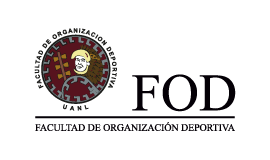Mission
To contribute to the development of the Bachelor’s Degree in Exercise Sciences in the distance learning modality through the use of new information and communication technologies, promoting equity, as well as the coverage and access to quality education based on flexible curricular principles, academic innovation, and social responsibility.
Vision
The Bachelor’s Degree in Exercise Sciences in the distance learning modality is acknowledged in 2020 for offering an education with a social and world-class focus, for its quality, relevance, and contributions to the academic, scientific, and social development of physical education, sports, recreation, and exercise sciences.
Objectives
In the School of Physical Education, with the aim at supporting the proper joint between the models of a world-class university and a socially responsible university, it is proposed that this undergraduate program in exercise sciences in the distance learning modality be handled under the objectives of UANL’s priority institutional programs that are reflected in our school’s Development Plan, which is detailed below:
- Responsible management of education. To promote the integral education of citizens who are socially responsible and highly competent in the knowledge society’s labor world.
- Responsible management of knowledge and culture. To establish scientific, technological, humanistic, and cultural development projects that contribute to the advancement of knowledge, sciences, technology, and culture, improving the level of human development of Nuevo Leon and Mexican societies and seeking a balance between the generation of economically relevant knowledge and the generation of socially useful knowledge.
- Strengthening academic staff and developing academic groups. To help our university have academic staff characterized by its high academic qualifications in accordance with the highest international standards, organized in fully consolidated academic groups, which nurture the generation lines and innovative application of knowledge that significantly and timely contribute to the social and economic development of the state and the country.
- Continuous improvement and quality assurance of institutional functions. To establish schemes, procedures, and actions that sustain the planning processes, continuous improvement, and quality assurance of academic and administrative programs and projects, framed in the institutional function development, considering the indicators and standards of national and international evaluation and accreditation organizations.
- Developing the Undergraduate Degree System. To broaden, articulate, and strengthen institutional capacities for professional, scientific, and humanistic education, which allows the university to anticipate and respond with greater opportunity, quality, and relevance to the adressing of important issues regarding the social and economic development of the state and the country.
- Exchange, linkages, and academic cooperation with the public, social, and industrial sectors. To establish schemes and processes to support collaboration, academic exchange, and linkages of our institutional work with the public, social, and industrial sectors, which contribute to consolidate UANL as an institution with a high degree of influence in the development of its functions.
- Socially responsible management of infrastructure and equipment. To expand, maintain, and upgrade the physical infrastructure and equipment of our university; to support the development of institutional functions by applying rigorous criteria of environmental management.
- Ensuring funds and economic development. To increase and strengthen our funding sources, as well as the university’s resources for the development of its functions and priority programs.
- Internationalization. To establish schemes that contribute to consolidate UANL as an institution with global focus, actively participating in international education networks and the generation, application, and dissemination of knowledge and culture.
- Responsible institutional management. To structure the projects and activities of UANL’s different academic and administrative entities in the coherent development of a project of social promotion and equitable and sustainable development, which comprehensively covers the following university functions: educating technicians, professionals, scientists, technologists, and humanists; generating, applicating, and disseminating knowledge and culture; building linkages and extensions with public, social, and industrial organizations; managing support for academic work.
Admission Profile
- Inclination for physical-sporting activities and their practice.
- Ability to communicate and relate to people.
- Intellectual restlessness to research on the origins and universal development of sport.
- Desire to know the physical education and sports in its historical perspective, its functions, structures and its forms of organization.
The proposed admission profile also implies the following:
- General physical fitness test results.
- Passing grade in the EXANI-II test or certificate of good health issued by a public health institution.
In addition to the above, we believe it is important to consider the students’ graduation profile at the upper intermediate level:
- Students express and communicate themselves.
- They reflexively think and criticize.
- They learn autonomously.
- They work collaboratively.
- They participate responsibly in society.
Graduation Profile
To educate human resources that are highly qualified in the areas of physical culture, sports and recreation by integrating the different techniques and scientific disciplines constituting our curriculum.
Labor Market
- Teaching
- Research
- Sports training
- Sports advising
- Sports coordination
- Sports promotion
- Sports instruction
- Sports institution management
- Physical training and public relations




